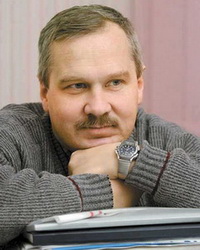Yury Vasilevich Yaremenko was an outstanding Soviet and Russian economist, member of the Academy of Sciences and Director of the Institute of Economic Forecasting of the Academy. He was especially noted for his work in multisectoral (input-output) economics and for his concept of the multi-level economy, a description of how the planned economy of the Soviet Union actually worked.

The International Institute for Applied Systems Analysis (IIASA) is an independent International research institute located in Laxenburg, near Vienna in Austria, founded as an East-West scientific cooperation initiative during the Cold War. Through its research programs and initiatives, the institute conducts policy-oriented interdisciplinary research into issues too large or complex to be solved by a single country or academic discipline. These include climate change, energy security, population aging, and sustainable development. The results of IIASA research and the expertise of its researchers are made available to policymakers worldwide to help them make informed and evidence-based policies.

Moscow State Institute of International Relations (MGIMO) is an institute of higher education located in Moscow, Russia. The institute is run by the Russian Ministry of Foreign Affairs.

The National Academy of Sciences of Belarus is the national academy of Belarus.

The German Institute for Economic Research, or, more commonly DIW Berlin, is a economic research institute in Germany, involved in basic research and policy advice. It is a non-profit academic institution, financed with public grants from the Berlin Senate Department for Economics, Technology and Research and the Federal Department for Economics and Technology. DIW Berlin was founded in 1925 as the Institute for Business Cycle Research and took its current name in 1943.
The Pan-European Institute (PEI) is a Finnish research institute operating at Turku School of Economics (TSE), which is part of the University of Turku. PEI focuses on the research and observation of the economic and social development, particularly in the Baltic Sea region economies and in the EU’s eastern neighbouring countries.

Azer Kamal oglu Amiraslanov is the Chairman of the Committee on Economic Policy, Industry and Entrepreneurship of the National Assembly of the Republic of Azerbaijan.

Elshan Mahmud oglu Hajizadeh is an Azerbaijani professor, doctor of economic sciences Academician of International Academy of Sciences, Academician of International Academy of Management, an Academician of International Transport Academy, foreign Member of the Russian Academy of Natural Sciences, Member of the International Union of Economists.

Dobrov Institute for Scientific and Technological Potential and Science History Studies of National Academy of Sciences of Ukraine (STEPS Center of NAS of Ukraine) (Ukrainian: Державна установа "Інститут досліджень науково-технічного потенціалу та історії науки ім. Г.М. Доброва НАН України") is a research institute of the National Academy of Sciences of Ukraine.

The Kyiv National Economic Universitynamed after Vadym Hetman is a self-governing public university in Kyiv, Ukraine. The university was founded in 1906 as Higher commercial courses.

The Classic Private University is a university in Ukraine. It was founded as Zaporizhzhia Institute of State and Municipal Administration (ZIDMU) in 1992. In November 2007, it changed its name from the "Humanitarian University "ZIDMU" to the "Classical Private University". The university has 6 institutes, a college. It offers postgraduate and doctoral programs in 11 specialties. There are five specialized academic councils for doctoral defense.
The East Asian Bureau of Economic Research (EABER) is a forum for economic research and analysis of the major issues facing the economies of East Asia.

Igor Yegorov is a Ukrainian economist, Sc.D. in Economics, Deputy Director of the Institute for Economics and Forecasting of the National Academy of Sciences of Ukraine, and Professor at the Faculty of Economics at the Taras Shevchenko National University of Kyiv. Until 2013 he was the Head of Department for Systemic Studies of S&T Potential at G.M. Dobrov Center for Scientific and Technological Potential and Science History Studies of the NAS of Ukraine. He is a member of the Academic Council of Scientific and Technical Complex for Statistical Research of the State Statistics Service of Ukraine.

Novosibirsk State University of Economics and Management, NSUEM (Russian: is a social and economic higher education institute in Novosibirsk, Russia.

Sergei Chernyshev, born 4 August 1952, Bohodukhiv, Kharkiv Oblast, Ukrainian Soviet Socialist Republic is a Russian philosopher, educator and expert in the field of organization and management science.
Science and technology in Armenia describes trends and developments in science, technology and innovation policy and governance in Armenia.
Science and technology in Uzbekistan examines government efforts to develop a national innovation system and the impact of these policies.

Arkadiy Ismailovich Sukhorukov is an expert on economic security issues, a Doctor of Economics, Professor, Honored Economist of Ukraine, Member of the Academy of Construction of Ukraine, and the Knight of the Order "For Merits" III degree.

The Center for Strategic Research, or CSR, is a Russian public policy think tank based in Moscow, Russia. The Center for Strategic Research (CSR) is a non-commercial organization that plays key role in elaboration and implementation of long-term development strategy of Russia's economy. CSR was established in December 1999.

Valentine Pavlovich Vishnevsky is a Ukrainian economist. He is a fellow of the National Academy of Sciences of Ukraine (2012) and professor of economics (2005). The area of his scientific interests includes economic theory, modelling of economic systems, fiscal, monetary and industrial policy.















